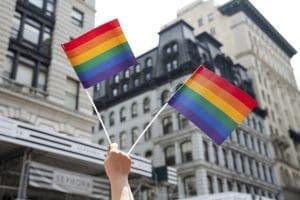Recent court ruling a win for LGBTQ teachers at religious schools
A federal judge found that a religious school violated federal law when it fired a gay man after he announced his engagement on social media.

A federal judge ruled in favor of a gay teacher who was fired from a religious school in North Carolina after the school discovered he planned to get married to his partner. On Sept. 3, U.S. District Judge Max Cogburn said the school and the Roman Catholic Archdiocese of Charlotte broke federal law when it terminated the teacher, Lonnie Billard.
Billard wrote a social media post about his engagement to his partner in October 2014. During Christmas dinner that year, he learned that his employment would be terminated because of his post a 2017 complaint explains.
He had been employed at Charlotte Catholic High School for more than a decade as both a full-time teacher and a substitute, winning a teacher of the year award in 2012, according to the American Civil Liberties Union, which represented him in the case.
The school claimed Billard was fired because his decision to inform people on Facebook of his engagement counted as “advocacy” outside of the school’s religious beliefs and that the religious nature of the school allowed it to be exempt from certain labor protections, according to the Associated Press.
But Cogburn did not accept the school’s argument because he said Billard wasn’t there to teach students about religious issues. The judge ruled that the firing broke Title VII of the Civil Rights Act of 1964, which relates to employment discrimination.
Now the case goes to trial so that the courts can determine relief for the teacher, which could include back pay and benefits, reinstatement, and attorney’s fees, which he requested in his 2017 complaint.
The Roman Catholic Archdiocese of Charlotte responded to the news by arguing that federal law and recent Supreme Court decisions support religious groups’ right to decide who they employ according to religious beliefs. But in 2020, in the landmark Supreme Court decision Bostock v. Clayton County, the court ruled that discrimination against LGBTQ workers is discrimination on the basis of sex. LGBTQ rights experts have said the case also affects other areas of discrimination, such as health care, housing, and education.
Many in the LGBTQ community have shared Billard’s experience. Research and surveys have found that LGBTQ people say employment discrimination is still prevalent in their lives.
According to a September 2021 report from the Williams Institute, a research institute out of the University of California, Los Angeles, 1 in 10 LGBTQ workers were discriminated against at work in the last year. Nearly 3 in 5 LGBTQ workers (57%) who said they experienced workplace discrimination said the people they worked with or for did something to lead them to think religious beliefs were behind the discriminatory action. The report also found that 1 in 4 LGBTQ people said they’d been fired or not hired at least once in their lives because they were LGBTQ.
Over one-third, or 36%, of LGBTQ people who participated in a 2020 Center for American Progress/NORC survey said they experienced workplace discrimination in the past year.
Lambda Legal, an LGBTQ rights organization, said work-related discrimination issues were “were the biggest driver” of requests for legal help related to sexual orientation in a March 2021 report. They made up 22% of total requests.
Research also shows that many LGBTQ people, like Billard, choose to work in education. According to a 2020 Human Rights Campaign data analysis that uses 2018 data from the National Opinion Research Center’s General Social Survey, the top five industries where LGBTQ people work include education, with almost 1 million LGBTQ employed in K-12 schools and almost 1 million employed in colleges and universities.
Published with permission of The American Independent Foundation.
Recommended

Alaska House committee advances, expands proposal to bar trans girls from girls sports
Amended bill would add elementary, middle school and collegiate sports to limits in place for high school
By Claire Stremple, Alaska Beacon - April 16, 2024
Senate clears gallery, passes bill to arm Tennessee teachers
Covenant parents emotional in wake of vote
By Sam Stockard, Tennessee Lookout - April 10, 2024
Not if, but when: Parents of slain Parkland students urge Utah lawmakers to pass school safety bill
The parents of children killed in the 2018 Marjory Stoneman Douglas High School shooting have a stark warning for Utah lawmakers: “It’s not a matter of if, it’s a matter of when and where the next school shooting will happen.”
By Kyle Dunphey, Utah News Dispatch - February 21, 2024








































































